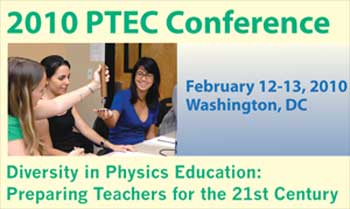From the Editor of the Teacher Preparation Section
John Stewart
This edition of the teacher preparation section features two electronic resources. In the first article, Dean Zollman will describe the Pathway Project, an innovative internet-based tool for delivering targeted teaching advice when it is needed. The Pathway website features an extensive database of videos of experienced teachers offering advice on the presentation of specific physics topics. These articles are indexed through an innovative natural-language search engine which allows a novice teacher to visit the site, type a question, and get help from an expert. In the second article, in my role as editor of PTEC.org, I will describe this extensive electronic resource for institutions dedicated to improving physics teacher preparation. PTEC.org is part of ComPADRE, the National Science Digital Library (NSDL) collection for physics and astronomy education. In the Fall 2007 Edition of this newsletter, editors of other ComPADRE collections described their sites. PTEC.org was recently redesigned and this is an excellent time to reintroduce its features. Before proceeding to the articles, two announcements of interest to the teacher preparation community: first the Physics Teacher Education Coalition conference to be held in Washington D.C. in February, and second a solicitation from PhysTEC for new PhysTEC sites.

The Physics Teacher Education Coalition (PTEC) annual meeting will be in Washington D.C. immediately preceding the joint APS "Apri" Meeting, AAPT Winter Meeting, the National Society of Black Physicists Meeting, and the National Society of Hispanic Physicists Meeting. The PTEC meeting will be held on February 12-13, 2010. The theme of the meeting is "Diversity in Physics Education: Preparing Teachers for the 21st Century". The conference will feature workshops ondiversity in teacher recruitment, preparing teachers for urban schools, closing the achievement gap, funding teacher education programs, collaborating across the sciences, and teaching pedagogical knowledge. The National Task Force on Teacher Education in Physics will release its report at the meeting; its findings will be presented in a plenary session. Registration is $75 for PTEC members; $250 for nonmembers. Registration will open in early November. For more information on the conference visit www.PTEC.org; for information on PTEC membership and how to join visit www.PTEC.org/join.
The PhysTEC project requests proposals for new PhysTEC sites to develop model physics teacher preparation programs, to begin in the 2010-2011 academic year. Proposals are solicited for two types of sites:
- Comprehensive sites, which will receive up to $100k per year for three years. These sites will implement the full PhysTEC program.
- Pilot sites, which will receive up to $25k per year for three years to implement specific elements of teacher preparation programs.
Institutions wishing to apply must submit a letter of interest by November 2nd 2009. Download the application guidelines at the PhysTEC website. Only PTEC members may apply; membership in PTEC is free. Visit the link in the previous paragraph to join. As the Co-PI of the University of Arkansas' PhysTEC site, I can attest to the transformative power of being a PhysTEC site. The connections built during the project with local school districts and with the College of Education have lived on beyond the project and have lead to further funded educational initiatives. Highly-qualified PhysTEC teachers are in classroom across Arkansas.
Disclaimer - The articles and opinion pieces found in this issue of the APS Forum on Education Newsletter are not peer refereed and represent solely the views of the authors and not necessarily the views of APS.
